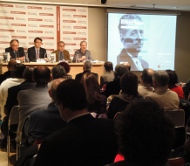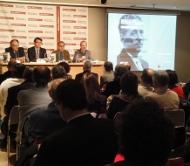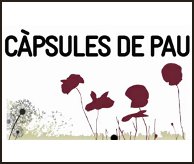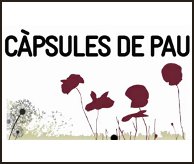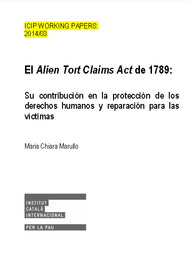This morning, Jovan Divjak, winner of the ICIP Peace in Progress Award 2013, participated in a colloquium at the Saló de Cròniques (Hall of Chronicles) at Barcelona City Hall. The event was moderated by the journalist Eduard Sanjuán, and participants included ICIP president Rafael Grasa, first deputy mayor of the Barcelona City Council, Joaquim Forn, and the promoter of District 11 – City to City, Manel Vila.
Jovan Divjak made a point of remembering all the people who defended the city of Sarajevo during the siege, and he defended the role of women in the conflict: “They carried all the weight.” He also expressed his gratitude for the actions of “many Catalans who helped the city.”
ICIP president Rafael Grasa explained the Balkan conflict of the 1990s. He denied that it was a war unlike others “if you apply the necessary instruments and a deep and radical observation.” Grasa described Divjak as a person without a mask: “authentic through and through.”
Manel Vila, promoter of the District 11 – City to City Foundation, stated, regarding Bosnia, that a conflict does not end when a peace agreement is signed. He also pointed out the importance of good humor and maintaining high morale, during the siege.
The first deputy mayor of Barcelona, Joaquim Forn, praised the figure of Divjak because he “demonstrates that reconciliation is possible and shows how an entire people have been able to look ahead.”
The event ended with the symbolic gesture of setting free several carrier pigeons with red ribbons. The pigeons left Camporrels for Sarajevo on a route organized by the Crisalida Foundation.
Author: whads
New website section dedicated to Research
The ICIP website has incorporated a new section dedicated to all the activity the Institute carries out within the area of Research and Knowledge Transfer. The section includes information on the various research projects financed by ICIP (through calls for FI-ICIP and R-ICIP grants), the results of the three monitoring units, or “observatories”, that currently exist (the Arms Cycle Observatory, the Textbook Observatory and the Peace Movement Observatory), and all the activity generated by the research program “Armed conflicts: law and justice”, created in 2010 and directed by Antoni Pigrau, professor of International Criminal Law at Rovira i Virgili University and vice-president of ICIP.
The website section is still under construction and will soon include activity generated by ICIP’s second research program, “Human security, conflict transformation and peace research”, directed by Rafael Grasa, professor of International Relations at the Autonomous University of Barcelona and president of ICIP.
The promotion of research and knowledge transfer, in collaboration with similar centers and universities, is one of ICIP’s goals, as reflected in the Multi-Annual Plan.
Summary of the presentation of the book ‘Lluís Companys: contra la guerra’
On Monday, February 17, ICIP presented the book Lluís Companys: contra la guerra , published jointly with Angle Editorial in the “Classics of Peace and Nonviolence” series.
The event, which took place at the Palau Robert in Barcelona, began with a minute of silence in memory and honor of Alfons Banda, vice-president of ICIP and director of the series, who passed away in Barcelona on January 30.
ICIP president, Rafael Grasa; the book’s publisher, Josep M. Figueres; the author of the prologue, Antoni Segura; and the Secretary General of the Department of Governance and Institutional Relations, Lluís Bertran, all took part in the session. In their speeches, all of the participants expressed words of gratitude and in memory of Alfons Banda for his work as head of the “Classics of Peace and Nonviolence” series.
Historical context
The book Lluís Companys: contra la guerra is a compilation of writings and speeches delivered in Parliament by the President of the Generalitat, Lluís Companys, against Spanish military presence and intervention in Morocco between the years 1921 and 1923. These were years of social agitation and violence in Catalonia, and especially in Barcelona, as Professor Antoni Segura, author of the prologue, pointed out in his speech. Segura contextualized Companys’s writings against the Spanish war in Morocco, delivered to the press and in Parliament following a trip by the President to Tangiers, and after the Disaster of Annual, “the Spanish Army’s greatest colonial disaster, with over thirteen thousand casualties.” Despite Companys’s harsh criticism of the war, Segura explained that the President’s position was in line with “general Republican denunciations against the Spanish Army, more than an ideological pacifism; it is not absolute antimilitarism.
The publisher, Josep M. Figueres, who has worked on the writings and speeches of Companys since 1997, “studying the newspapers and magazines of the time – such as L’Avenir and El Diluvio – page by page” expressed a similar opinion. Figueres explained that Companys opposed the war, not out of ideological or altruistic convictions, but rather to protest against the corruption and lack of professionalism of the Spanish Army, while at the same time demanding that all the politicians who had served in State institutions be held accountable.
According to the publisher, the book is an example of “the recovery of the memory of a president and of a country.”
Summary of the presentation of the book ‘Lluís Companys: contra la guerra’
On Monday, February 17, ICIP presented the book Lluís Companys: contra la guerra , published jointly with Angle Editorial in the “Classics of Peace and Nonviolence” series.
The event, which took place at the Palau Robert in Barcelona, began with a minute of silence in memory and honor of Alfons Banda, vice-president of ICIP and director of the series, who passed away in Barcelona on January 30.
ICIP president, Rafael Grasa; the book’s publisher, Josep M. Figueres; the author of the prologue, Antoni Segura; and the Secretary General of the Department of Governance and Institutional Relations, Lluís Bertran, all took part in the session. In their speeches, all of the participants expressed words of gratitude and in memory of Alfons Banda for his work as head of the “Classics of Peace and Nonviolence” series.
Historical context
The book Lluís Companys: contra la guerra is a compilation of writings and speeches delivered in Parliament by the President of the Generalitat, Lluís Companys, against Spanish military presence and intervention in Morocco between the years 1921 and 1923. These were years of social agitation and violence in Catalonia, and especially in Barcelona, as Professor Antoni Segura, author of the prologue, pointed out in his speech. Segura contextualized Companys’s writings against the Spanish war in Morocco, delivered to the press and in Parliament following a trip by the President to Tangiers, and after the Disaster of Annual, “the Spanish Army’s greatest colonial disaster, with over thirteen thousand casualties.” Despite Companys’s harsh criticism of the war, Segura explained that the President’s position was in line with “general Republican denunciations against the Spanish Army, more than an ideological pacifism; it is not absolute antimilitarism.
The publisher, Josep M. Figueres, who has worked on the writings and speeches of Companys since 1997, “studying the newspapers and magazines of the time – such as L’Avenir and El Diluvio – page by page” expressed a similar opinion. Figueres explained that Companys opposed the war, not out of ideological or altruistic convictions, but rather to protest against the corruption and lack of professionalism of the Spanish Army, while at the same time demanding that all the politicians who had served in State institutions be held accountable.
According to the publisher, the book is an example of “the recovery of the memory of a president and of a country.”
Summary of the presentation of the book ‘Lluís Companys: contra la guerra’
On Monday, February 17, ICIP presented the book Lluís Companys: contra la guerra , published jointly with Angle Editorial in the “Classics of Peace and Nonviolence” series.
The event, which took place at the Palau Robert in Barcelona, began with a minute of silence in memory and honor of Alfons Banda, vice-president of ICIP and director of the series, who passed away in Barcelona on January 30.
ICIP president, Rafael Grasa; the book’s publisher, Josep M. Figueres; the author of the prologue, Antoni Segura; and the Secretary General of the Department of Governance and Institutional Relations, Lluís Bertran, all took part in the session. In their speeches, all of the participants expressed words of gratitude and in memory of Alfons Banda for his work as head of the “Classics of Peace and Nonviolence” series.
Historical context
The book Lluís Companys: contra la guerra is a compilation of writings and speeches delivered in Parliament by the President of the Generalitat, Lluís Companys, against Spanish military presence and intervention in Morocco between the years 1921 and 1923. These were years of social agitation and violence in Catalonia, and especially in Barcelona, as Professor Antoni Segura, author of the prologue, pointed out in his speech. Segura contextualized Companys’s writings against the Spanish war in Morocco, delivered to the press and in Parliament following a trip by the President to Tangiers, and after the Disaster of Annual, “the Spanish Army’s greatest colonial disaster, with over thirteen thousand casualties.” Despite Companys’s harsh criticism of the war, Segura explained that the President’s position was in line with “general Republican denunciations against the Spanish Army, more than an ideological pacifism; it is not absolute antimilitarism.
The publisher, Josep M. Figueres, who has worked on the writings and speeches of Companys since 1997, “studying the newspapers and magazines of the time – such as L’Avenir and El Diluvio – page by page” expressed a similar opinion. Figueres explained that Companys opposed the war, not out of ideological or altruistic convictions, but rather to protest against the corruption and lack of professionalism of the Spanish Army, while at the same time demanding that all the politicians who had served in State institutions be held accountable.
According to the publisher, the book is an example of “the recovery of the memory of a president and of a country.”
ICIP extends collaboration with Bogotá Chamber of Commerce
ICIP and the Bogotá Chamber of Commerce have extended their collaboration agreement until October 2015. The aim of this agreement is to design methodological proposals that identify expectations and interests of the private sector in a post-conflict scenario in Colombia. As a result of this agreement, in force since 2013, ICIP has recently participated in various activities in the Latin American country related to the analysis of the peace process. Worth noting, for example, is the participation of ICIP president Rafael Grasa in the forum Truth, Forgiveness and Reconciliation: A Road for Peace in Colombia; in the Business for Peace initiative; and in the 4th Social Responsibility Congress of El Nogal Foundation, entitled Peace and Reconciliation in the Territories.
Another result of the collaboration between ICIP and the Bogotá Chamber of Commerce is the publication of the Guía para la construcción de la paz. Qué es y qué supone la construcción de la paz, by Rafael Grasa and Óscar Mateos. This publication was presented in the 4th Congress of the Global Compact Network Colombia, Architects for a Better World.
With the intention of following the evolution of the peace process in Colombia, ICIP also has collaboration agreements with the War College (Escuela Superior de Guerra), the Mayor’s Office of Medellín and the Colombian Federation of Municipalities.
What is Peace to Francisco Soto?
A new video of the project ‘Peace Capsules’ , coproduced by ICIP and Col·lectiu Contrast, has been published this week on the ICIP website. It is a short one minute long video entitled ‘What is Peace to Francisco Soto? ‘ and in which Soto, director of Human Rights Legal Action Centre, considers what peace means to him. The video is accessible both on the ICIP website and on the ICIP Youtube Channel .
Until the 21st September 2014, International Day of Peace, ICIP will publish a new video capsule each week. Each capsule will count with the participation of an activist, actor or academic who will think of what peace means to him/her. The aim of the project is to compile different approximations to the concept ‘peace’ on the ICIP website.
What is Peace to Francisco Soto?
A new video of the project ‘Peace Capsules’ , coproduced by ICIP and Col·lectiu Contrast, has been published this week on the ICIP website. It is a short one minute long video entitled ‘What is Peace to Francisco Soto? ‘ and in which Soto, director of Human Rights Legal Action Centre, considers what peace means to him. The video is accessible both on the ICIP website and on the ICIP Youtube Channel .
Until the 21st September 2014, International Day of Peace, ICIP will publish a new video capsule each week. Each capsule will count with the participation of an activist, actor or academic who will think of what peace means to him/her. The aim of the project is to compile different approximations to the concept ‘peace’ on the ICIP website.
What is Peace to Francisco Soto?
A new video of the project ‘Peace Capsules’ , coproduced by ICIP and Col·lectiu Contrast, has been published this week on the ICIP website. It is a short one minute long video entitled ‘What is Peace to Francisco Soto? ‘ and in which Soto, director of Human Rights Legal Action Centre, considers what peace means to him. The video is accessible both on the ICIP website and on the ICIP Youtube Channel .
Until the 21st September 2014, International Day of Peace, ICIP will publish a new video capsule each week. Each capsule will count with the participation of an activist, actor or academic who will think of what peace means to him/her. The aim of the project is to compile different approximations to the concept ‘peace’ on the ICIP website.
El “Alien Tort Claims Act” de 1789: su contribución en la protección de los derechos humanos y reparación para las víctimas
What is Peace to Aída Quilcué?
A new video of the project ‘Peace Capsules’, coproduced by ICIP and Col•lectiu Contrast, has been published this week on the ICIP website. It is a short one minute long video entitled ‘What is Peace to Aída Quilcué?’ and in which Quilcué, Human Rights program coordinator of Consejo Regional Indígena del Cauca (CRIC), considers what peace means to her. The video is accessible both on the ICIP website and on the ICIP Youtube Channel .
Until the 21st September 2014, International Day of Peace, ICIP will publish a new video capsule each week. Each capsule will count with the participation of an activist, actor or academic who will think of what peace means to him/her. The aim of the project is to compile different approximations to the concept ‘peace’ on the ICIP web site.
ICIP Research, a new book collection
ICIP has presented a new book collection, entitled “ICIP Research ”, the aim of which is to disseminate texts that share a clear leitmotif: research for peace and nonviolence. ICIP Research gathers the results of research activities carried out by the Institute on topics such as armed conflicts, human security, conflict resolution and transformation, international relations, international law and peace building.
Addressed specifically to academia and to peace workers, the texts are published in any of the languages of the collection: English, Catalan, Spanish or French.
The first issue of the collection, published in English, is:
-Companies in conflict situations. Building a Research Network on Business, Conflicts and Human Rights .



